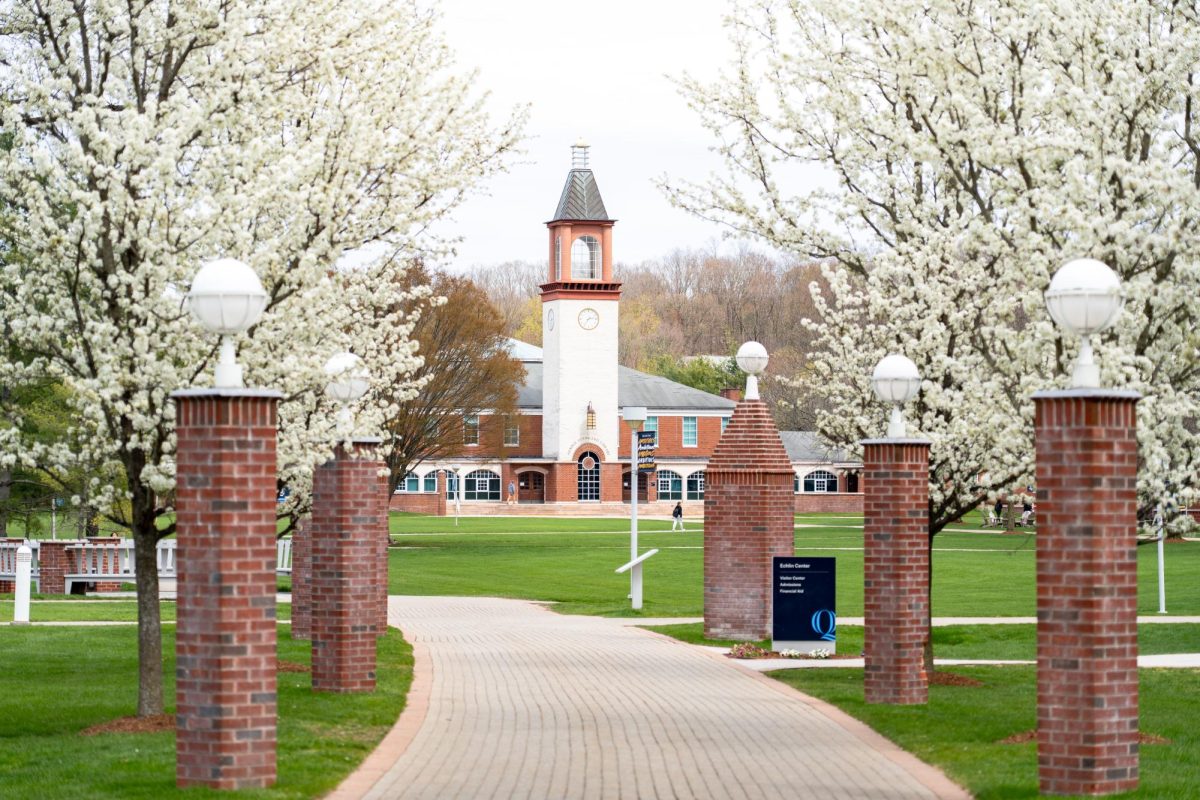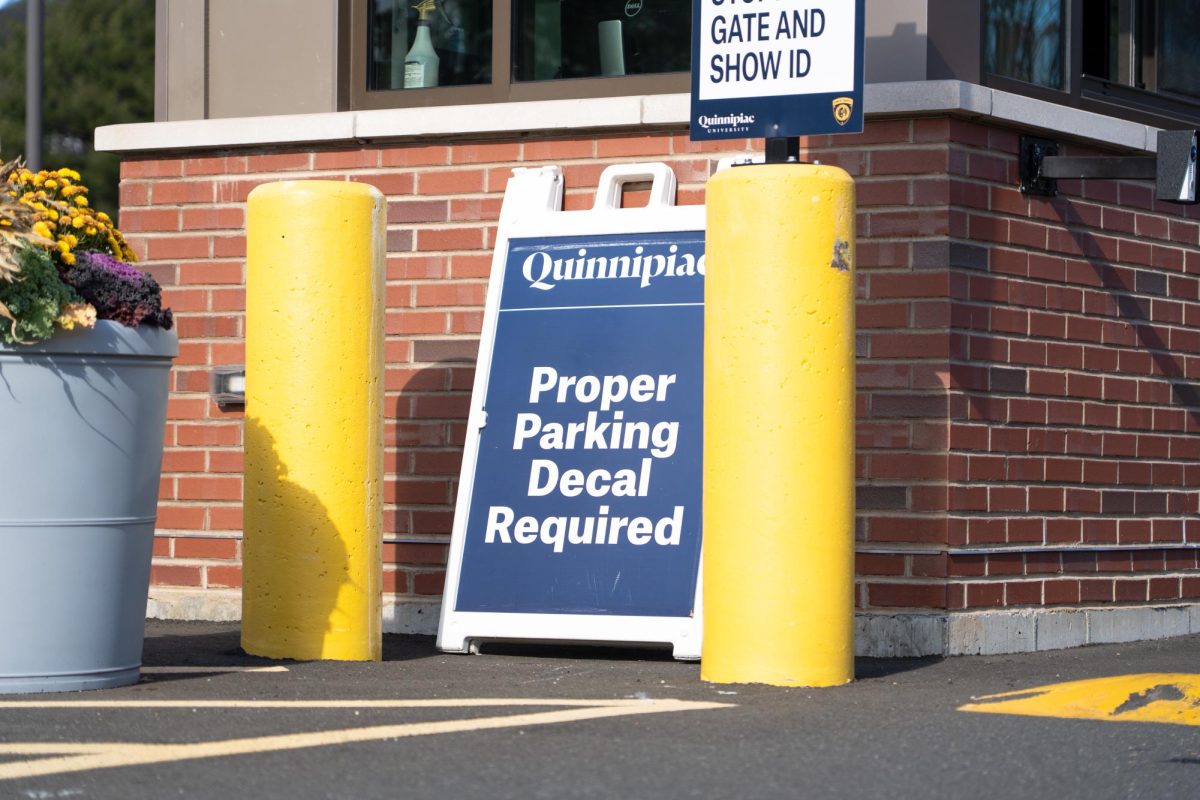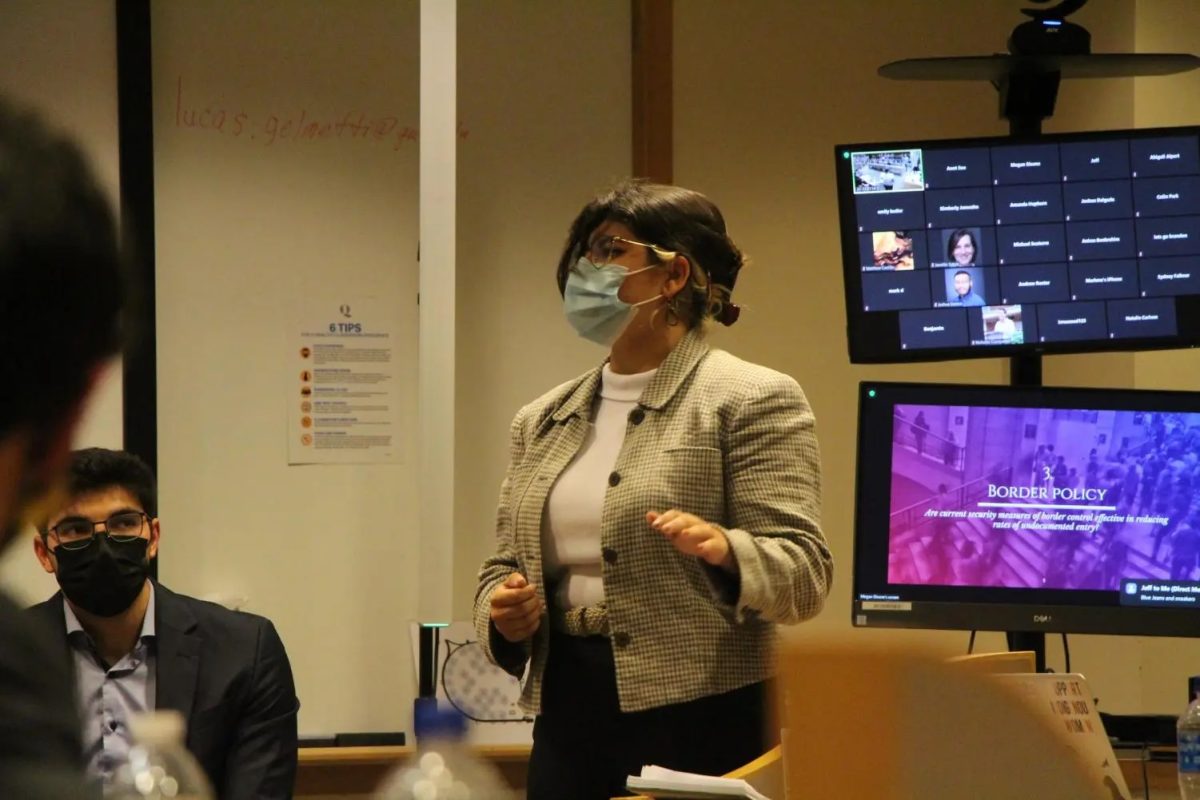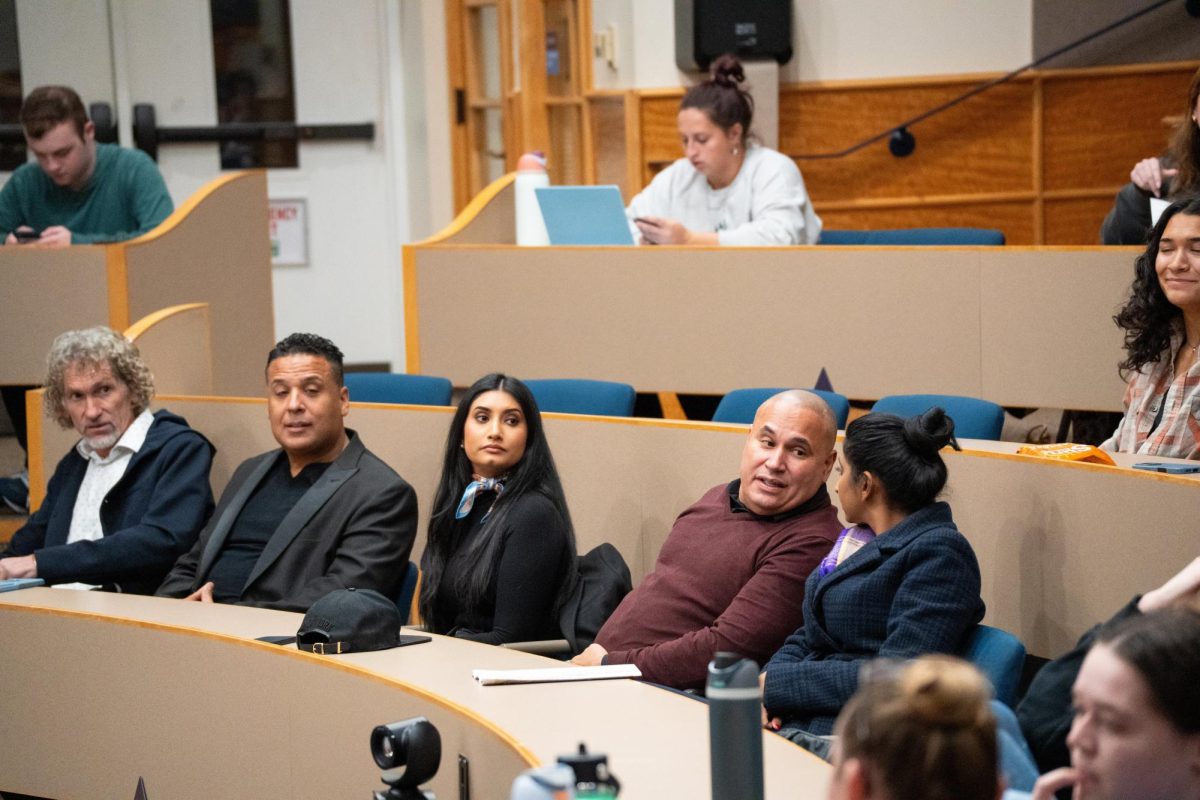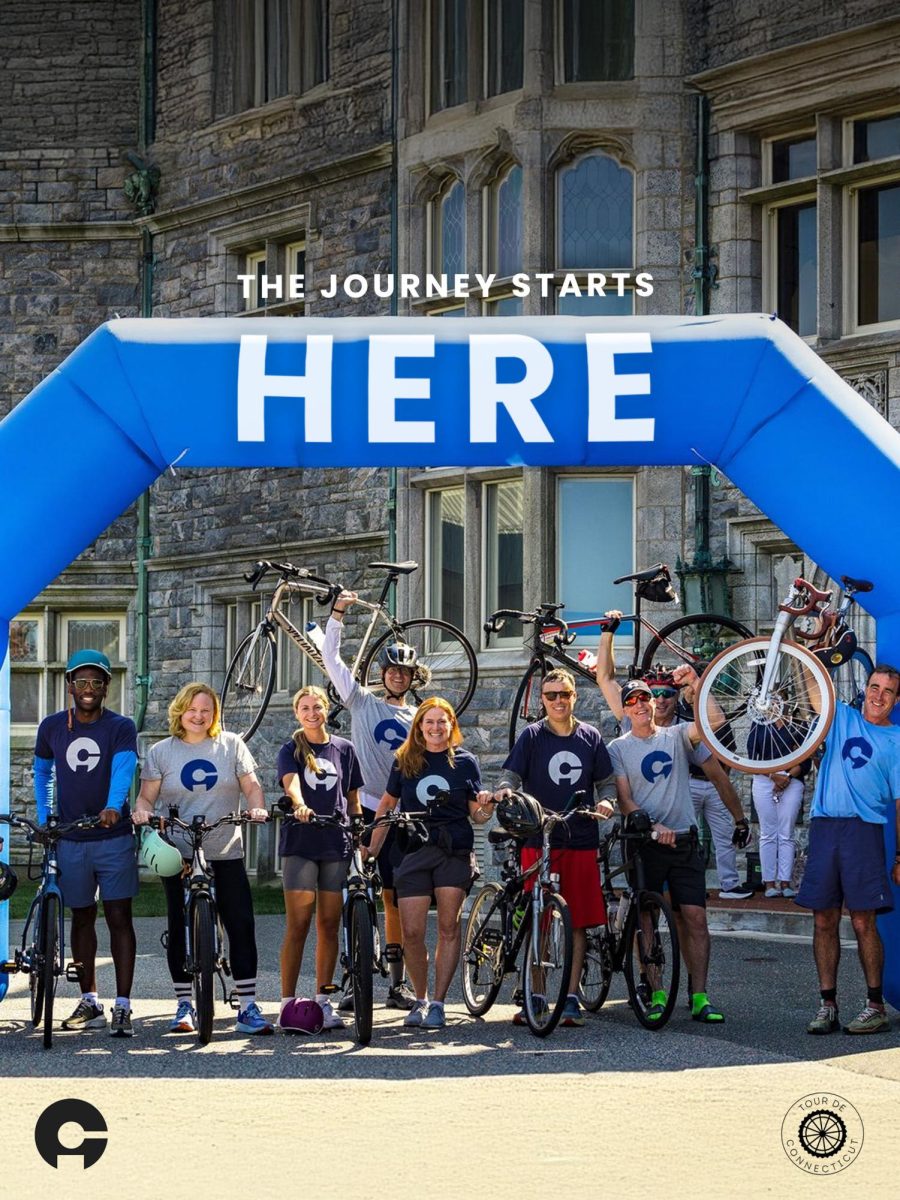Quinnipiac University’s Students for Social Justice and Multicultural Student Leadership Council held a collaborative panel event on Nov. 13 called “Voices for Palestine,” featuring panelist speakers that focused on “education, dialogue, and collective reflection on Palestinian identity, resistance and the power of community in shaping liberation.”
The panel featured speakers Basel Alnajjar, Layan Alnajjar and Sam Pudlin.
Siblings Basel and Layan Alnajjar, Palestinian-Syrian activists, are cofounders of the non-profit organization We Will Return, “Fighting for the liberation of our homeland through activism, humanitarian aid, and education.” They grew up in Hartford, but their mother was born in Palestine.
Pudlin is the founder of the Hartford Jewish Organizing Collective (HJOC) and a charter member of the Connecticut Palestine Solidarity Coalition.
The event was moderated by SSJ Co-Presidents Xiomara Saavedra-Vicente and Mariam Saad and SSJ’s Vice-President and MSLC President Tahira Jilu. The organizations began collaborating in spring 2025 to plan the event.
The event opened with discussion of how identity has shaped the panelists’ activism. Basel reflected on his Muslim ethnicity and religion
“These three identities paired into effect, really just motivated me and inspired me to become an artist,” Basel said. “You see your family going through occupation, going through ethnic cleansing, going through restriction of movement that’s going on over there.”
Layan explained it from a different perspective: academically and professionally. She graduated from the University of Connecticut with a major in marketing and a minor in management, with a concentration in digital marketing analytics.
Layan explained that it’s helpful to use your biggest strengths to contribute to the movement.
“For me, I’m good at marketing, I’m good at social media, I’m good at engagement metrics, I’m good at making flyers,” Layan said. “So I inserted myself in the movement in that way.”
Pudlin agreed that identity plays a large role in activism.
“(HJOC) is designed to organize on an affinity basis,” Pudlin said. “(Affinity organization) allows you to create these small communities that can be so much more durable than other types of political organization, that can really get people together, bonded.”
The panelists also described the barriers they’ve faced when it comes to advocacy. Basel spoke from the perspective of a former college student, reflecting on his time at UConn.
“Every single thing that we tried to do was shut down by (administration),” Basel said.
Layan highlighted a protest held at UConn by the Students for Justice in Palestine in 2021, where the organization, Hillel, passed out “Islamophobic pamphlets” at the protest, which conflated Islam and the pro-Palestine movement with terrorism.
In 2024 Quinnipiac’s Students for Justice in Palestine was the original name of Students for Social Justice. However, the University’s Office of Student Engagement denied the organization until the name was changed, according to a statement made by SSJ at the time.
Layan continued that one of the biggest barriers is the silence from your universities and employers. She said to “expose” them by taking to social media and documenting what is going on.
Pudlin noted that he’s known people who have lost their jobs and been harassed for their involvement in activism.
“It can get bad, but at the end of the day, that’s just blackmail,” Pudlin said, adding that you can’t be blackmailed if everything you stand for is already made public.
When asked about anti-semitism, he said that, “This conflation of opposition to Israel with anti-Semitism puts us in real, physical danger.”
He noted a specific example.
“We are moving rapidly from a point where they say all criticism of Israel is anti-Semitic to only criticism of Israel is anti-Semitic,” Pudlin said. “When Elon Musk threw a hand for a salute, they were the first ones out there saying, ‘No, it’s not so bad. He’s a good guy, right? Don’t worry too much about it.’ It’s appalling.”
It’s not just universities that try to silence you. Basel said that sometimes it’s your own community, too.
“You’re supposed to essentially assimilate into the American mindset,” Basel said.
When asked about misconceptions regarding Palestine, Layan says that Palestinians are seen as argumentative and aggressive, but in reality, they don’t want to be fighting.
Pudlin explained that he was taught those misconceptions.
“We are taught most of us, almost all of us, in our homes, in Hebrew school, at summer camp, some of the most outrageously racist, Islamophobic things you will ever hear in your life,” Pudlin said.
Layan added to this sentiment.
“They’ve been given this image of just monsters walking here,” Layan said. “And I don’t think you meet these two guys and think like, ‘yeah, they’re probably wearing a bomb vest, right now,’ right?”
This statement prompted a comment from a member of the audience to joke: “Why do you think there’s so much security?” referring to the Public Safety presence with multiple officers at the entrance points.
“The safety and well-being of every member of our community is always our highest priority,” John Morgan, associate vice president for public relations, wrote a statement to The Chronicle. “Public Safety was at the event in a supportive role and had met with the student group that organized the event in advance to coordinate logistics. Their presence was part of the routine safety support we provide at many campus gatherings as part of our commitment to the community.”
The panelists were then asked what true solidarity with Palestinians looks like from non-Palestinian allies. Basel said that despite their mother being Palestinian, he and Layan don’t have more of a right to speak on the Palestinian situation than other people in the world.
“The only way that I know if you’re fully on my side is if you do not police Palestinians on how to resist,” Layan added. “You don’t act like you know how to resist and how you would act in that situation, so you don’t try to tell them what’s moral and what’s okay and how you should resist.”
Junior Health Science major and treasurer of SSJ Hana ElMaghraby asked what changes had been seen in Connecticut, in terms of policy and activism.
“(Senator Chris) Murphy is a big one,” Pudlin said.
Pudlin explained that after meeting constantly in his office, they were able to persuade him. However, he says that Senator Richard Blumenthal isn’t going to be moved and “don’t waste your time on people who can’t be moved.”
He also says that there’s “cowardice” when it comes to government officials.
“There are people who I personally know to be on our side, who just think it’s too big of a risk to ever say something in public,” Pudlin.
Layan and Basel reflected on seeing a shift in the public, noting that many countries support Palestine but that people in the United States focus more on Israel.
The last discussion question asked by the panelists was, “What strategies have been effective in pushing back against censorship or disciplinary action related to pro-Palestine activism?”
Basel explained that it’s very hard to get people to care, and it’s also difficult to find strategies to fight censorship.
“It’s not asking people to listen, but forcing personalism,” Basel said.
He argued that the most effective way is to talk to someone, verbally inviting them to a meeting. When it comes to censorship, he says you have to be “undeniable.”
“If there’s a street shut down every day because we’re having a protest and nobody on the news is talking about it, that looks weird; people are going to notice,” Basel said. “You have to put them in a position where they have to at least report that you exist, even if you’re not getting a friendly report out of it, because silence is a much more powerful tool.”
Pudlin also advises on dealing with disciplinary and legal action, encouraging planning.
“Start raising money,” Pudlin said. “If people are going to get arrested for this thing, they’re going to need a lawyer while they’re in jail, or they’re not getting out of jail. Once you have that, find the lawyers.”
The moderators then changed to audience questions. Audience members were able to use a QR code to ask their questions anonymously.
The first question from the audience was regarding President Donald Trump, asking, “Where do you see the future of Palestinian activism specifically under Trump’s presidency?”
Pudlin responded that he did things that were “a little different under Trump,” but policy and strategy on Palestine haven’t changed at all.
He says that the types of people who would be organizers towards the Palestinian movement are “going to want to go work with the immigrants that are being snatched in the streets,” he says, “their energy is being diverted elsewhere.”
Another question asked about Mayor-elect Zohran Mamdani’s recent win in the New York City Mayoral race, asking if “What do you think his victory indicates about the changing landscape of American public opinion on Palestine?
Basel, who now lives in New York City, says, it’s a whole new world. “We’re actually doing something right now… our actions have actually shown up and manifested themselves in the legitimate political landscape of the world.”
After the event, The Chronicle asked Basel and Layan how their upbringing influenced how they fight for justice today.
“Our parents were very much… they wanted us as kids to kind of figure it out on our own…. We weren’t raised, like super aggressively pro-Palestine,” Layan said, and Basal agreed.
Layan continued, “We knew our Palestinian identity, we knew our Syrian identity, but we weren’t, you know, let’s say, out on the streets like you see us now.” They both agreed that they “figured it out on their own.”
Layan and Basel are both close to college age, and they said that they can relate to college students when they speak to them.
“I feel like whenever I talk to a younger crowd, I just see myself,” Layan said, “I know what the student experience is like. I know what it’s like to be censored on campus. I know what it’s like to feel like you don’t have a voice on campus, that your administration doesn’t support you.”
Basel agreed and added, “We can see the old generation who have been fighting for years and years for this movement, and still have not seen anything. Yet we thankfully and fortunately were the ones to actually see a change in the movement.”
Pudlin brought the perspective of the older generation, “I love working with student groups. I think it’s really important that you guys get organized, keep it together, because you’re gonna graduate. Eventually, you all are gonna graduate, and the skills that you’re building here are the ones you’re gonna be able to take back home with you or wherever you’re going and continue the struggle there.”
3+1 Film Major Zoe Matzelle spoke to The Chronicle about her thoughts on the event, “I think hearing from people that are actually from Palestine is like really interesting. And it kind of gives you more of a perspective on, you know, people that deal with this personally and what they actually go through.”
ElMaghraby also reiterated Matzell’s point about the importance of the Palestinian perspective.
On what it means to be Palestinian, Basel says, “you embrace that identity, and Palestinian identity means being strong, means being fearless. It means not backing down. It means being caring, loving, supportive, community-based, and everything pure in the world is embodied by what it means to be truly Palestinian.” He says that Palestine is a moral identity, not an ethnic one.



